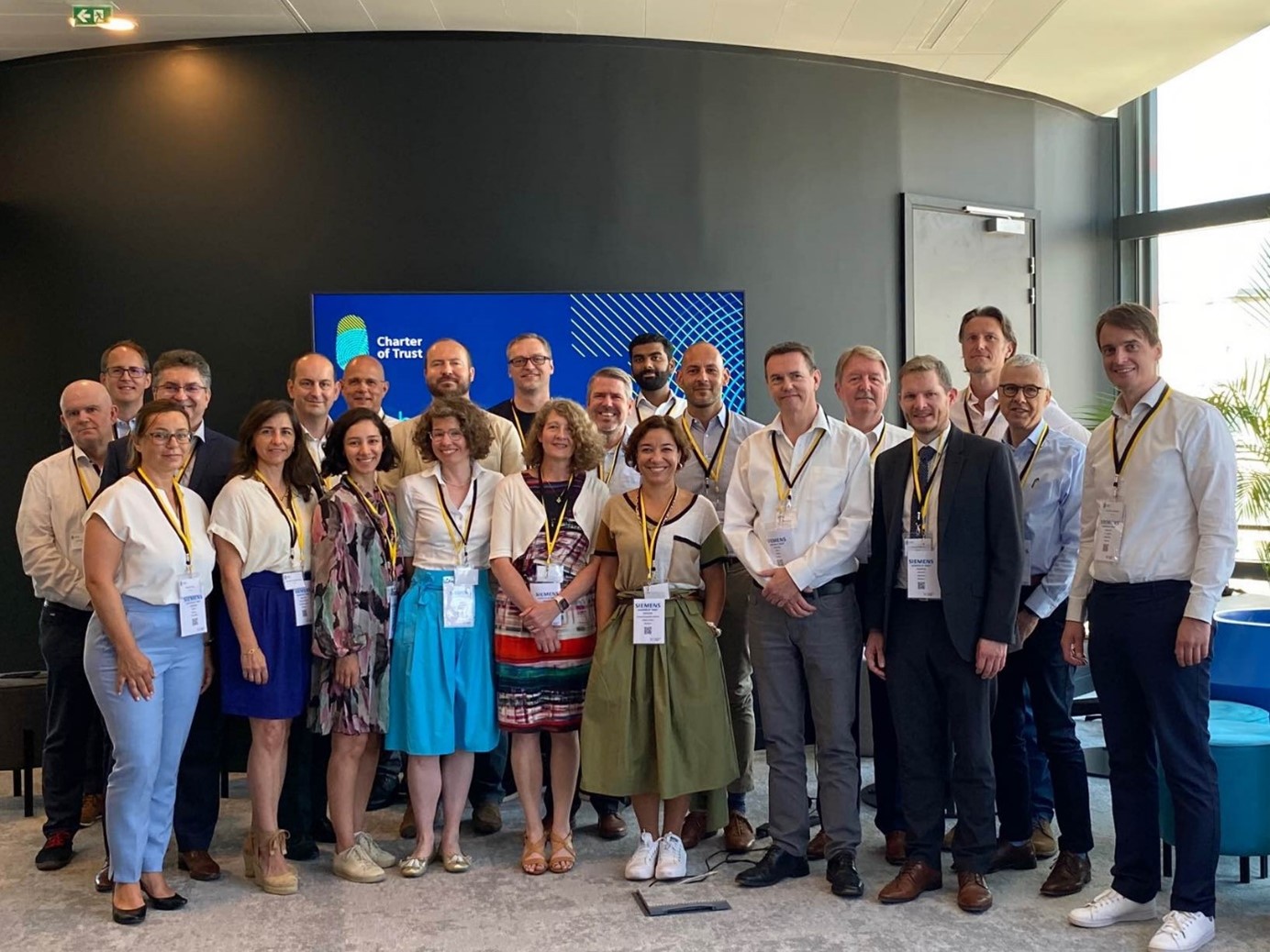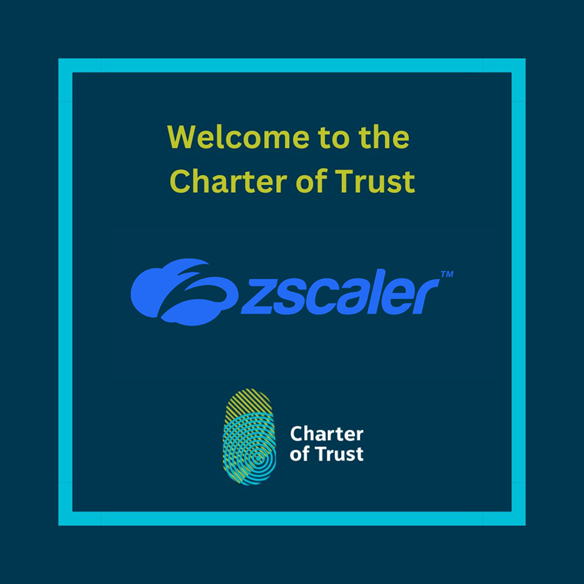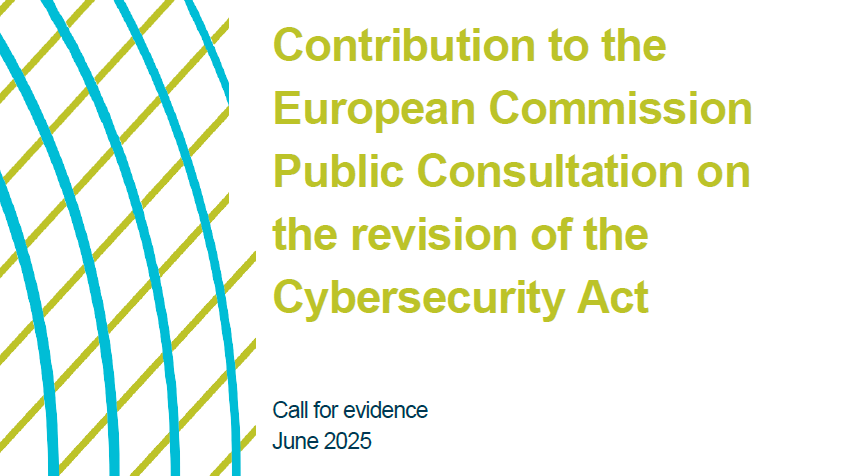Between 28 and 30 June 2022, representatives from Partner companies around the world gathered in Paris for the Charter of Trust’s second Collaboration Week of the year. Principle Taskforces came together with the aim of further building up the strategic priorities of the Charter of Trust, with the Associated Partner Forum also gathering to support those missions.

After over two years of behind-the-screen collaboration, Charter of Trust members have had the opportunity to gather in person in Paris to take stock of the work done since the previous Collaboration Week in February 2022 and set concrete objectives for the coming months leading towards the next Collaboration Week in 2023. Over the course of three days that were filled with working sessions and discussions, Charter of Trust Partners met in taskforces each dedicated to one of the 10 Principles – with the ones active during this Collaboration Week including:
Principle 3 Taskforce “Security by Default”
The Collaboration Week was an opportunity for P3 Members to go forward on the Phase 3 of the taskforce, which aims at presenting the outcomes of the first two phases to the public. As such, Members held fruitful exchanges on the step-by-step document on secure development lifecycle and agreed on their next webinar topic.
Principle 8 Taskforce “Transparency and response”
P8 Members initiated the next steps of the taskforce for the second half of 2022 at the Collaboration Week, including work on the NIS 2 directive and the mapping of international cyber regulations. The Collaboration Week was a great success in resolving pending issues and engaging in the next steps of the taskforce.
Principles 2 and 6 “Responsibility throughout the supply chain” and “education”
The Supply Chain Taskforce came together in break-out groups, building upon the discussions from a previous workshop in Munich, Germany in May 2022. The Members agreed on next steps, including harmonizing questionnaires for supplier assessments, aiming to pilot the project by the end of the year.
Advocacy & Communications Taskforce
The advocacy and communications experts of the Charter of Trust gathered to exchange on how to better grow awareness externally among policymakers, regulators and stakeholders to promote harmonisation of regulatory requirements and recognition of Charter of Trust initiatives, with a view to delivering driving changes.
Associated Partner Forum
After formally introducing the Brazilian Centre for International Relations (CEBRI), the Associated Partner Forum hosted an open discussion round on cybersecurity policy and the digital dimension of escalating international conflicts. In a context where war does not happen only on battlefields, representatives shared how internationally escalating conflicts have affected their institutions, how they have learned to adapt and what the main consequences for international cyber policy and cyber diplomacy could be. The Associated Partners also received an update on the work of various Taskforces.
The Charter of Trust looks forward to making the discussed changes happen in the coming months. We therefore invite you to stay tuned for additional contributions and events to further advance the synergetic nature of the initiative!


You may also like

Charter of Trust Welcomes Zscaler
Zscaler is a leading cloud enterprise security provider helping global businesses accelerate their digital transformation by becoming more agile, efficient, resilient, and secure.
With Zscaler as a partner in the Charter of Trust, we aim to strengthen global cyber resilience through trust – by fostering actionable collaboration between industry leaders, governments, and public-private platforms. Zscaler brings robust expertise and innovation to the table, making it the ideal partner to drive this mission forward.
“Zscaler is excited to drive meaningful change alongside our new partners, laying a foundation of trust essential for successful digital transformation,” said Sam Curry, Zscaler CISO. “In today’s world, the need for reducing inherent trust and default access has never been greater. To truly stay ahead of ever-evolving threats, we must unite as a coalition of practitioners. Cyber attackers aren’t taking breaks, and with advancements like artificial intelligence, quantum cryptography, and emerging technologies on the horizon, collaboration is the key to securing the future.”
“We are proud to welcome Zscaler to the Charter of Trust. Their focus on cybersecurity innovation and commitment to openness reflect our shared ambition to create a safer, more resilient digital future. Together, we’ll strengthen trust, transparency, and security across the global digital landscape.” highlighted Dr. Summit Chada, Charter of Trust Co-Chair and COO Group Security & Business Lines CISO at Atos.
“With Zscaler as a Partner of the Charter of Trust, we believe that we can strengthen the global commitment to secure digital transformation by combining technological innovation with the Charter of Trust’s collaborative approach to cybersecurity leadership.” Ralf Schneider, Charter of Trust Co-Chair and Senior Fellow and Head of Cybersecurity and NextGenIT Think Tank at Allianz SE, welcomes Zscaler to the Charter of Trust.
We are excited to join forces and work together to advance digital trust and security across industries.

Contribution to the EU Commission Public Consultation on the revision of the Cybersecurity Act
We support Policy Option 2, which focuses on targeted regulatory measures that address key challenges without creating unnecessary complexity. In this context, we emphasize the need to enhance the role and resources of ENISA, to ensure effective implementation of both current legislation and the European Cybersecurity Certification Framework (ECCF).
Our recommendations aim to improve transparency, collaboration, and efficiency across the EU’s cybersecurity landscape. These include:
- Introducing clear timelines for the development of certification schemes.
- Enhancing stakeholder engagement throughout the process.
- Establishing more structured communication channels between ENISA, the Stakeholder Cybersecurity Certification Group (SCCG), and sectoral ISACs (Information Sharing and Analysis Centers).
We call for a stronger ECCF, one that is transparent, inclusive, and aligned with international standards to foster global interoperability and ease compliance for organizations across borders. Equally critical is the harmonization of certification practices across EU member states and the mutual recognition of certifications to minimize regulatory fragmentation.
The Charter of Trust advocates for technically robust, standards-based certification schemes, with well-defined roles and responsibilities. We also stress the need for clarity on the interplay between voluntary and mandatory certifications, particularly in relation to the upcoming Cyber Resilience Act (CRA).
To streamline compliance and reduce administrative burden, we propose a unified, risk-based incident reporting regime that consolidates requirements under regulations such as NIS2, CRA, GDPR, and DORA. This would not only simplify reporting for organizations but also enhance the EU’s overall cyber resilience. In addition, we recommend incorporating liability protections and grace periods for incident disclosure.
Finally, we urge the Commission to strengthen supply chain security by adopting a risk-based classification approach and establishing baseline cybersecurity requirements for ICT suppliers.
The Charter of Trust remains fully committed to supporting the European Commission in shaping a secure, resilient, and trusted digital future for Europe. We look forward to continued collaboration in building a cybersecurity framework that meets the needs of all stakeholders, today and in the years to come.




